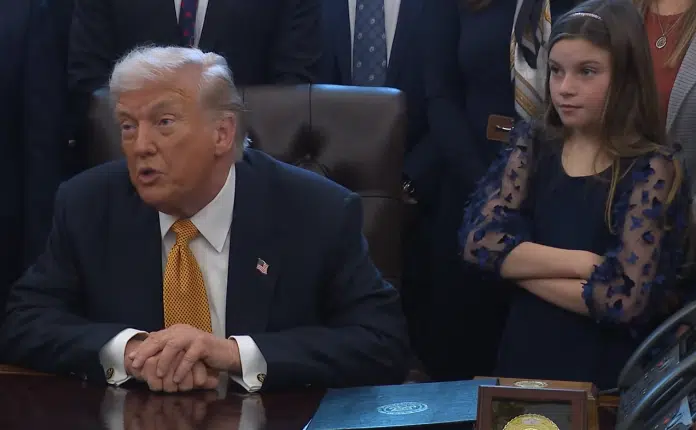By Robert Romano – House Republicans have unveiled a very strong presentation they are making to constituents while Congress is on recess this week. It could indicate that a strong push is coming to rein in mandatory spending, meaning the $61 billion the House has proposed cutting from non-defense discretionary is only the beginning of the work to be done in bringing the nation’s fiscal House into order.
That’s good, because the proposal to cut spending in the continuing resolution does nothing to address the problems House Republicans outline in their presentation to constituents. Of course, they may have inadvertently opened up a can of worms of problems that need to be explained to the American people.
* * *
According to a fact sheet being distributed by the House Republican Conference, “our nation’s retirement and health security programs, coupled with our debt payments, are the real drivers of our debt crisis.”
The presentation cites a Tarrance Group poll demonstrating public misconceptions about the nature of the nation’s sovereign debt crisis, which says, “A majority of voters incorrectly believe the federal government spends more on defense/foreign aid than it does on Medicare and Social Security (63 percent).” In fact, security spending accounted for $815 billion in 2010 compared to $1.147 trillion for Medicare and Social Security.
Overall, so-called mandatory, autopilot spending, which includes Social Security, Medicare, Medicaid, and other programs, will account for $27.3 trillion from 2012-2021, compared to just $8.5 trillion for security spending, according to the Office of Management and Budget. Mandatory spending comes about because of congressionally enacted laws based on eligibility determinations rather than line-item appropriations, thus requiring the money to be spent whether Congress votes up or down on new monies to be dispensed.
Currently, such spending accounts for $1.95 trillion a year, but that number will rise to $3.47 trillion by 2021, a 91 percent increase. Security spending, on the other hand will only rise from its current $815 billion level to $914 billion in 2021, a mere 12 percent increase.
The Tarrance Group poll outlines the uphill battle Republicans will have with bringing these facts to the attention of the American people. “Less than half (44 percent) believe Medicare and Social Security costs are a major source of problems for the federal budget (49 percent disagree),” says the poll. That’s bad, because mandatory entitlement spending by every measure is threatening to consume the entire budget.
As a result, the presentation urges Americans to “share the facts with your family, friends, neighbors, and co-workers” and to “let them know ignoring the problem will only make the problem worse”. That’s putting it mildly.
While there is a general sense among Americans that spending has increased dramatically since 2007, when the financial crisis began, most are probably not aware of by just how much Congress has increased taxpayer liabilities. In 2007, the budget was $2.728 trillion with a budget deficit of just $160.7 billion, but will rise in 2011 to $3.818 trillion with an eye-popping $1.645 trillion deficit. That’s a $1.09 trillion or 39 percent increase in spending in just four years, and a 923 percent increase in the budget deficit.
How could the deficit go from $160.7 billion to $1.645 trillion in just four years? A small part of it was the recession, which found revenues plummeting from $2.567 trillion in 2007 to a projected $2.173 trillion for 2011. But that only accounts for $394 billion of the increased shortfall.
Mandatory spending increases account for $745 billion of it, which has risen from $1.449 trillion to $2.194 trillion in 2011. Discretionary spending, which includes defense spending, has increased by $374 billion since 2007. In that subcategory, defense spending increased by $213 billion.
In other words, if the economy and thus revenues completely recovered to their 2007 levels, and discretionary spending was cut by a gargantuan $374 billion, the budget deficit this year would still be well over $700 billion.
But that’s only the beginning of the problems House Republicans have with explaining the extent of the fiscal catastrophe facing the American people.
* * *
One thing the House Republican presentation fails to outline is why the large debt is in fact unsustainable. Nations all over the world have large debts, but when anyone proposes paying it down, folks may not fully understand why it is necessary to reduce its size. “Why can’t we just keep borrowing?” is the question that is asked, and it is the one that the political Right must answer in order to make the strongest case possible for reining in spending.
Because if the nation could just keep borrowing ad infinitum without any harm, there really would be no reason to ever cut spending.
Of course, the reason that the debt must in reality be reduced is because the entirety of the debt, now $14.1 trillion, has to constantly be refinanced. When refinancing is added to the deficit spending, this year $1.645 trillion, the government now has to issue over $2 trillion in treasuries every single year. By 2021, it will about $4 trillion a year in treasuries sold to refinance and create new debt as the total debt climbs to over $25 trillion. By then, total interest payments (net interest plus interest owed on Social Security and Medicare trust funds) will be over $1 trillion, and well over $2 trillion by 2030.
The raiding of the trust funds alone is an issue that needs to be unpacked. Congress thought it was wise to grow the trust funds by allowing them to earn interest by converting the funds into treasuries. That’s fine if one assumes an infinite supply of money and an unlimited capacity to borrow. As outlined above, the size of the debt to refinance plus spiraling interest payments prove the fallacy of that assumption. People are going to wish they had stuffed that money into mattresses and told FDR and LBJ to take a hike.
Because the government never contemplates debt repayment, every year, the amount of borrowing necessary to refinance and engage in deficit-spending grows, until soon there will be a day the markets will simply not have enough loot to lend to us. That day of reckoning could happen this decade, but if it doesn’t, it will most certainly happen next decade.
An immediate solution to preventing that sort of catastrophe is to prohibit the Fed from purchasing treasuries directly and from funneling easy money into the primary dealers to buy them. Once the Fed’s direct purchases stop in June, at which time the Fed’s treasuries holdings will be about $1.5 trillion, the central bank’s discount lending at less than the rate of interest on treasuries appears to be the only way we will even able to meet our current financing obligations. So, an easy way to deal with the problem is to add a constraint on borrowing, forcing Congress to make massive cuts. Bernanke could do this unilaterally if he chose to.
So, if we had a responsible steward of the currency, it would be cost prohibitive to print money for the purpose of buying debt. This would in turn impose borrowing constraints on the government. If those constraints were put into place before the tidal wave of refinancing hits the Treasury, the fiscal catastrophe we face could be averted.
* * *
Overall, House Republicans have a considerable challenge explaining the enormity of problems the nation faces. Because Washington, D.C. has lacked leadership, most Americans are not aware that mandatory entitlement spending by far is what is driving the sovereign debt crisis, and is largely the reason the deficit has gotten so out of control. Finally, Americans do not understand the mechanisms by which the government borrows, including the enabling role played by the Federal Reserve.
All of this needs to be explained to the American people so that, politically, they have the tools they need to make decisions about which public officials are playing straight with them on the $14.1 trillion national debt. This may be a vexing can of worms, but this is one can of worms that everyone really needs to see — before it is too late.
Robert Romano is the Senior Editor of Americans of Limited Government.






